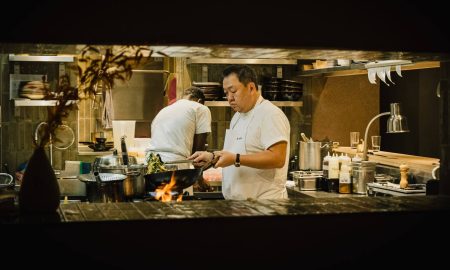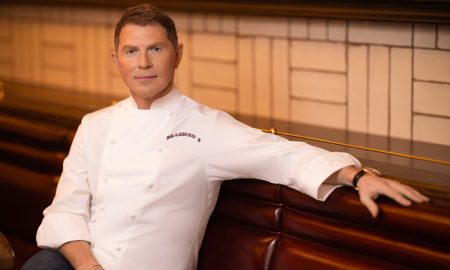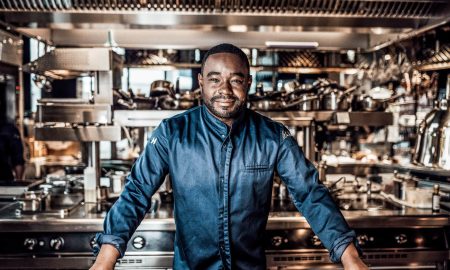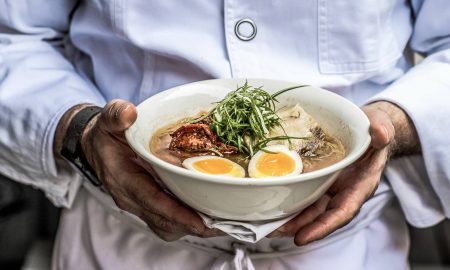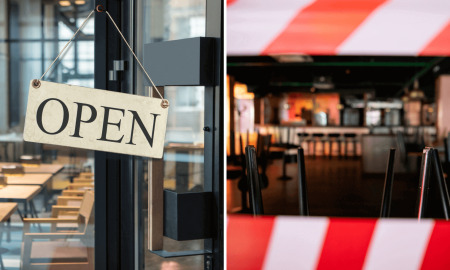Bronx to the world: Ghetto Gastro’s gourmet ‘hood
Most New Yorkers rarely venture into the Bronx unless the Yankees are playing. The borough has a long history of gang violence, a child poverty rate of around 40 %, and a reputation as a place you wouldn’t want to walk around alone at night. Given that it also has the city’s highest obesity rate, the Bronx isn’t generally associated with culinary highlights – but now four locals are taking a stand, fighting back against the stereotype through soul food. The culinary collective’s founding quartet (Jon Gray, Pierre Serrao, Lester Walker, and Malcolm Livingston II) are celebrating their Bronx background by showing that their hood has more to offer.
Their unique blend of activism and aroma definitely works – not despite their differences, but because of them. Under their motto of “Bronx to the world. World to the Bronx.”, they use great food as their vehicle for calling attention to injustices and celebrating what makes their borough unique. They describe their culinary style as “Black Power Kitchen” – a multidisciplinary approach drawing upon art, music and activism to create food as diverse and inspiring as the people and cultures in their part of town. Although the Ghetto Gastro cocktail blends design, DJs and flashy presentation, the most important ingredients to its success are the four chefs themselves. This isn’t just a bunch of media gimmickry – these are true professionals at work.
Sieh dir diesen Beitrag auf Instagram an
The Robin Hoods of the hood
Lester Walker’s path to success started with a cooking course in high school; after finishing college on a scholarship, he worked at several world-class and Michelin-starred restaurants in New York, including Jean Georges and Eleven Madison Park. Malcolm Livingston II’s culinary resume is nothing to sneeze at, either – among other places, he worked as the head pastry chef at Noma in Copenhagen. Serrao, meanwhile, studied at the Italian Culinary Institute in Piedmont, and has cooked for Beyoncé and Jay-Z, P. Diddy and the Beckhams. Jon Gray is the only one of the four with less of a foodie background – he previously managed and designed for the fashion label Mottainai. What the four Ghetto Gastro definitely have in common is their dedication to advancing social justice and African-American rights.
They see themselves as the Robin Hoods of their ‘hood, taking from the rich and giving to the poor. And they’re firm on that point: Ghetto Gastro’s minimum booking volume is $50,000, so their projects represent opportunities to bring projects and jobs to the borough. One AirBnB event, for example, gave 70 Bronx residents work for the day. Besides creating soul food, they’re also doing good things for the soul of the neighborhood – they have an organic food line and a vegetable garden in the works, and they’re working with other New York restaurants to help excess food find its way into Bronx kitchens. At GG Labs, Ghetto Gastro’s culinary laboratory, their mission statement is to improve living conditions in “problem areas”. Making that happen requires an additional ingredient, one that culinary collective members are exceptionally skilled in cultivating and using: attention.
Hip hop meets haute couture
On the first night of New York Fashion Week, the label Woolrich celebrates “American Soul”. The collection is a nod to the country’s creative minds, with the New York music scene front and center. This year, former Fugees lead singer Lauryn Hill helped the label design a line of casually glamorous streetwear. The motto of the evening is reflected in Ms. Hill’s soulful songs, in the fashion presented, and in even in the hors d’œuvres – and, yes, the flambéed yams (“yambroghinis”) making their way around the room are Ghetto Gastro originals.
Sieh dir diesen Beitrag auf Instagram an
It’s just one of the many glamorous and exciting events the collective has catered. The menus are packed with nostalgic nods to intercultural childhood favorites, like pillowy Cuban puff pastry bites or Southern classics like chicken and waffles. They don’t shortchange fine dining either, though. Classics like “crab and cornbread” make their appearance in the form of crab velouté with Beluga caviar and freeze-dried cornbread crunch. Kobe beef and lobster in saffron butter take “surf & turf” to a whole new level.
The list of past customers for this on-trend combo reads like a Who’s Who of America – they’ve catered for Microsoft, Nike, Apple, several world-famous designers, and personalities ranging from Hillary Clinton to Puff Daddy. At one event for the label Pigalle, Ghetto Gastro dished up an especially provocative blend of food-as-social commentary: the Bronx restaurant served “lines” of crushed, dried coconut on mirrors.
Ghetto Gastro: Ambassadors of the Bronx restaurant scene
As with “Black Bodies,” the deconstructed apple pie playing homage to the Black Lives Matter movement, the coconut cocaine (entitled “Whiteout”) was intended as a tribute to the hedonism of 1980s Miami. The boundaries between dinner and art aren’t the only ones blurred under Ghetto Gastro’s difficult-to-define strategy: while using food to shake up the country’s political consciousness, the collective seems to have become a lifestyle brand almost as an afterthought. But even though they seem to spend their days jetting from business meetings to Vogue photo shoots, they’ve never forgotten their roots. They want “ghetto” to mean more than a synonym for “failure”. According to Walker, they’re helping make that happen by strengthening the community, creating community gardens, improving nutritional education, and offering free meals – only then, he says, can it truly be called a Black Power Kitchen.







